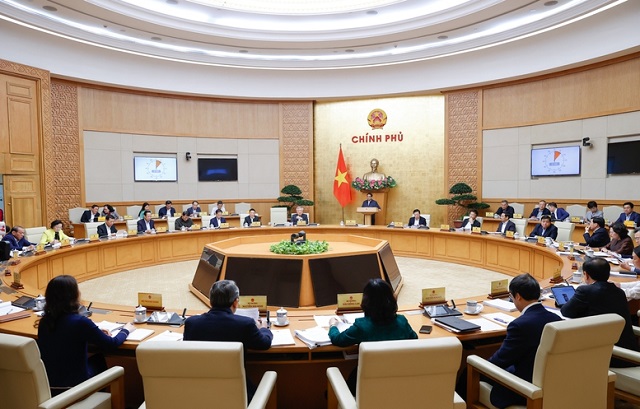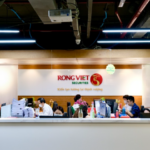
Prime Minister Pham Minh Chinh chairs the regular December 2024 Government meeting, covering a range of important issues – Photo: VGP/Nhat Bac
|
With urgency and determination, the Government is streamlining its organizational structure to enhance its effectiveness and efficiency, in accordance with Resolution No. 18-NQ/TW.
The Government has instructed ministries, ministerial-level agencies, and Government agencies to thoroughly grasp the orientation, plan, and timeline for streamlining the Government’s organizational structure as directed by the Central Steering Committee for the implementation of Resolution No. 18-NQ/TW. Emphasis should be placed on effective communication to foster consensus and unity during this process. Additionally, proposals for organizational refinement should be put forward, along with appropriate measures to address personnel-related issues and policies.
Ministries, ministerial-level agencies, and Government agencies are urged to promptly establish Steering Committees, headed by their respective leaders, to oversee the streamlining process in alignment with the directives of the Central Steering Committee and the Government’s Steering Committee for the implementation of Resolution No. 18-NQ/TW. All available resources should be prioritized to comprehensively execute the tasks and orientations outlined in the Government’s streamlining plan, as well as those assigned by the Central Steering Committee. This should be approached with a sense of urgency and determination, reflecting the spirit of “if not now, then never,” “no retreat, only forward,” and “setting aside personal interests for the greater good.”
The following tasks related to organizational restructuring must be completed by the end of December 2024, adhering to specific deadlines: (1) Finalize the report on the implementation of Resolution No. 18-NQ/TW; (2) Develop proposals and plans for organizational restructuring in alignment with the requirements and orientations of the Central Steering Committee and the Government’s Steering Committee; (3) Draft a decree outlining the functions, tasks, authority, and organizational structure of ministries and agencies post-restructuring; (4) Review legal documents directly related to organizational restructuring; (5) Formulate a plan for the establishment of Party Committees within ministries, ministerial-level agencies, and Government agencies under the Government’s Party Committee, along with draft regulations for their operations.
Focus on identifying and addressing bottlenecks in policies, mechanisms, and regulations to maximize the mobilization of social resources.
The Government has tasked ministries, agencies, and local authorities with promptly issuing plans and preparing the necessary conditions for the timely and effective implementation of laws and resolutions passed by the National Assembly during its 8th session. This includes expediting the preparation of guiding documents to ensure that new regulations are swiftly put into practice, meeting the socio-economic development requirements. For laws that will come into effect on December 1, 2024, January 1, 2025, January 15, 2025, and February 1, 2025, respective ministries and agencies should conduct thorough reviews and proactively draft detailed documents to ensure their simultaneous enactment with the laws.
There is a focus on reviewing and issuing, within their authority, legal documents that address critical bottlenecks and create breakthroughs, particularly in urgent and necessary matters. This approach aligns with the spirit of the 10th Plenum of the 13th Party Central Committee, aiming to create a conducive environment to attract high-quality international investment and technology.
It is imperative to uphold the principles of innovation in the formulation and issuance of legal documents, while strengthening discipline, improving control mechanisms, and preventing corruption, negativity, and “interest groups” in law-making. The responsibility of leaders of coordinating, cooperating, and reviewing agencies at each stage of the legal document formulation process must be emphasized.
Continue to prioritize promoting growth while maintaining macroeconomic stability, curbing inflation, ensuring major economic balances, and striving to achieve the highest possible socio-economic development goals for 2024, setting the stage for accelerated growth towards the 8% target in 2025.
Ministries, agencies, and local authorities are instructed to closely monitor and comprehensively assess emerging domestic and international developments and their implications for Vietnam’s socio-economic landscape. This proactive approach will enable the formulation of appropriate and effective policies and solutions. Monetary policy should be proactively, flexibly, and effectively managed, in coordination with a reasonably expanded fiscal policy and other macroeconomic policies, to support production and business activities and boost growth drivers.
Determination is required in implementing solutions for state budget collection, with a proactive and positive spirit, ensuring accurate, timely, and sufficient collection, expanding the tax base, and combating tax evasion, especially in areas such as land use, e-commerce, and digital platforms. The goal is to exceed the state budget collection target for 2024 by at least 15%. Unnecessary recurrent expenditures should be cut to prioritize investment in development and social welfare, ensuring efficiency and focus.
It is crucial to closely monitor the market, supply-demand balance, and commodity prices, particularly for essential goods, to implement suitable and effective solutions for market stabilization. This is especially important during the year-end and Tet holiday season, ensuring sufficient supply, preventing shortages, disruptions, and sudden price increases.
The Ministry of Finance is assigned to lead and coordinate with relevant agencies and localities to urgently finalize and submit to the Government a decree on value-added tax reduction for the first six months of 2025, in accordance with the resolution of the 8th session of the 15th National Assembly. This should be completed by December 15, 2024. Additionally, the Ministry should continue researching and proposing to competent authorities policies on tax exemption, reduction, extension, and fee and land rent waivers to support people and businesses in production and business activities for implementation from the beginning of 2025. These proposals should be based on a comprehensive assessment of overall effectiveness, adopting a forward-looking, strategic approach.
The State Bank of Vietnam is tasked with coordinating relevant agencies to manage exchange rates and interest rates in line with macroeconomic developments and set targets, maintaining stability in the monetary, foreign exchange, and gold markets, as well as the safety of the credit institution system. Credit growth should be directed towards supporting production and business activities, achieving the target of 15% credit growth in 2024. Simultaneously, the State Bank should instruct credit institutions to strive for a reduction in lending interest rates, focusing credit on production and business sectors, priority areas, and growth drivers, while closely controlling credit in potentially risky fields.
With determination and urgency, accelerate the disbursement of public investment capital, implement the three National Target Programs, expedite the progress of key national projects, and promptly finalize and deploy master plans in 2024.
Ministries, agencies, and local authorities are instructed to concentrate their leadership and direction on vigorously and effectively implementing tasks and solutions to promote the disbursement of public investment capital, striving to achieve a disbursement rate of 95% of the plan assigned by the Prime Minister.
Project owners and management boards are urged to promptly complete legal procedures, finalization, and submission of completed volume dossiers to the State Treasury as a basis for control, payment, and reimbursement in accordance with regulations. It is imperative to expedite the finalization and payment to contractors, ensuring the disbursement of the 2024 capital plan as scheduled, without accumulation of completed but unpaid volumes or year-end payment concentration. Strengthen inspection and review, and decisively settle final accounts for completed projects according to regulations.
Localities should allocate capital plans for 2025 for the three National Target Programs, prioritizing the allocation of local budget capital to ensure swift disbursement of capital sources for these programs from the beginning of 2025.
It is imperative to finalize and approve the master plans for Hanoi and Ho Chi Minh City, as well as national sectoral master plans, with a definitive deadline of 2024.
The Ministry of Transport and localities should promptly address difficulties and obstacles, focusing on compensation, site clearance, and accelerating the progress of strategic and key national transport infrastructure projects, including airports, seaports, expressways, inter-regional and inter-provincial projects. Active preparation should also be made for investment in several important railway projects, notably the high-speed North-South railway, railways connecting Vietnam and China, urban railways in Hanoi and Ho Chi Minh City, and expressway projects for the 2026-2030 period. Additionally, there should be an upgrade and expansion of previously invested expressways to complete the scale according to the master plan.
Intensify efforts to develop industrial and agricultural production and key sectors, ensure energy and food security, accelerate national digital transformation, promote green, circular, and creative economies, and foster new, high-tech industries.
Ministries, agencies, and localities are instructed to attract investment in projects that produce goods to replace imports, gradually reducing dependence on foreign raw and auxiliary materials. It is crucial to review and promptly address bottlenecks in projects producing important industrial and processed goods to ensure their early operation, thereby enhancing the country’s production capacity.
Economic cooperation and dialogue should be promoted with comprehensive strategic partners and strategic partners, effectively utilizing the mechanism of task forces working with individual businesses and investors to attract multinational corporations and strategic investors in areas such as semiconductors, artificial intelligence, and digital technology. Additionally, allocate appropriate financial resources to programs that train and develop human resources for the core industries of electronics, digital technology, and related sectors.
Effectively implement Proposal 06, integrating and sharing data to form a digital citizen ecosystem, driving national digital transformation, and bringing about significant improvements in online public services, reducing red tape, time, and compliance costs for businesses and citizens.
The Ministry of Industry and Trade is assigned to take the lead, in coordination with relevant ministries, agencies, and localities, in proactively implementing resolute solutions to ensure national energy security and adequate electricity and fuel supply for production, business, and consumption, with no room for shortages in any situation. The Ministry should also coordinate with the Ministry of Foreign Affairs and relevant agencies to promptly propose the implementation of tasks related to the restart of the Ninh Thuan nuclear power project, in line with the National Assembly’s resolution at its 8th session.
The Ministry of Agriculture and Rural Development is assigned to collaborate with relevant ministries, agencies, and localities to strengthen the management, monitoring, and forecasting of agricultural production, directing the promotion of green and clean agricultural production, enhancing quality and food safety, ensuring national food security, and facilitating effective exports. Effectively implement the proposal for the sustainable development of 1 million hectares of high-quality and low-emission rice cultivation in the Mekong Delta while proactively responding to the risks of drought and saltwater intrusion.
Strengthen the domestic market and stimulate domestic consumption, expand export markets, implement comprehensive solutions for the year-end and Tet holiday season, promote administrative procedure reform, create a favorable business environment, and resolutely address stagnant and inefficient projects.
Ministries, agencies, and localities, within the scope of their functions, tasks, and authority, are instructed to implement synchronous and effective solutions to stimulate domestic consumption in their respective areas and nationwide. Actively promote the “Vietnamese People Give Priority to Using Vietnamese Goods” movement, encourage distribution through digital platforms and e-commerce, and enhance digital skills for the public, especially in utilizing e-commerce.
Strengthen the management of cross-border e-commerce activities, inspect and control the market, and strictly handle, in accordance with regulations, acts of trading in smuggled, counterfeit, and substandard goods, as well as those that violate food safety regulations and other dishonest business practices. It is imperative to enhance digital skills for the public, especially in the use of e-commerce.
Vigorously and synchronously implement solutions and policies to promote and attract international tourists, taking advantage of the year-end travel season to achieve the target of 18 million international tourist arrivals in 2024.
Ensure timely, complete, and accurate publication and transparency of administrative procedures as prescribed. All administrative procedures must be received and processed through the online public service portals of ministries and provincial-level authorities, synchronized with the National Public Service Portal. Close coordination with the Government Office is essential to upgrade the National Database of Administrative Procedures, ensuring progress and quality.
Focus on digitizing and completing the construction of national and sectoral databases, ensuring “accuracy, comprehensiveness, cleanliness, and timeliness.” The Ministry of Public Security is urged to expedite the construction of the National Data Center, aiming to put it into operation in June 2025.
Continue to proactively and resolutely address stagnant projects, weak businesses, and banks. Conduct a comprehensive review, classify, and propose mechanisms and policies to remove obstacles, aiming for early completion, preventing waste, releasing resources, and contributing to socio-economic development.
The Ministry of Industry and Trade is assigned to actively organize promotional programs on a national scale during the year-end and Tet holiday season, enhance connections and distribution of One Commune One Product (OCOP) products, bring goods to deep rural and industrial areas, and synchronously and effectively implement solutions to stimulate the domestic market, linking production with distribution and consumption to boost the consumption of domestically produced goods.
The State Bank of Vietnam is instructed to direct credit institutions to actively provide loans to serve production, business, and consumer needs during the year-end and Tet holiday season.
Vigorously promote the “Joint Efforts to Eliminate Temporary and Dilapidated Houses Nationwide in 2025” movement to achieve the goal of eliminating all temporary and dilapidated houses in 2025.
Ministries, agencies, and localities, within the scope of their functions, tasks, and authority, are instructed to promote information and communication activities leading up to the 14th Party Congress, highlighting major themes such as new trust and momentum, national potential, position, and international prestige, opportunities and challenges, and the Party’s historical responsibility to propel the country forward in the new era. Emphasize education and orientation of thought and public opinion regarding the fight against corruption, waste, and negativity, and strengthen the struggle against wrong and hostile views.
Unlocking Vietnam’s Renewable Energy Potential: Overcoming Hurdles for a Brighter Future by February 2025
Prime Minister Pham Minh Chinh has instructed relevant authorities to address all obstacles and challenges faced by renewable energy projects by January 31, 2025. This proactive measure aims to prevent wastefulness of already invested capital and ensure a supplementary energy source to meet the economic development goals for 2025.
Governor of Thanh Hoa Province: Achievements Instill Trust in Citizens
“The achievements are significant and pivotal in giving us the momentum and confidence to stride towards our 2025 goals. They reassure and reinforce the people’s faith in the leadership and guidance of the Provincial Party Committee, the People’s Council, the Provincial People’s Committee, and the authorities at all levels.” – Chairman of the Thanh Hoa Provincial People’s Committee, Do Minh Tuan, stated at the 24th session of the 18th term of the Thanh Hoa Provincial People’s Council.
“Setting the Stage for Double-Digit Growth in the 2026-2030 Period”
“Setting the tone for the government meeting on December 7th, Prime Minister Pham Minh Chinh emphasized the need to strive for a GDP growth rate of over 7% in 2024 and approximately 8% in 2025. These ambitious targets are designed to provide a strong foundation and momentum for the 2026-2030 period, with a goal of achieving double-digit growth.”
Unlocking Economic Growth: Unleashing Production and Business Through Policy Reform
Prime Minister Pham Minh Chinh concluded the regular Government meeting on the morning of December 7, emphasizing that policy formulation must be forward-thinking, ambitious, and bold. He stressed that policies should “unshackle” production and business activities to unleash their full potential, with the primary focus on boosting economic growth. This, in turn, will increase per capita income, raise labor productivity, improve the material and spiritual lives of the people, and enhance the country’s stature.




















